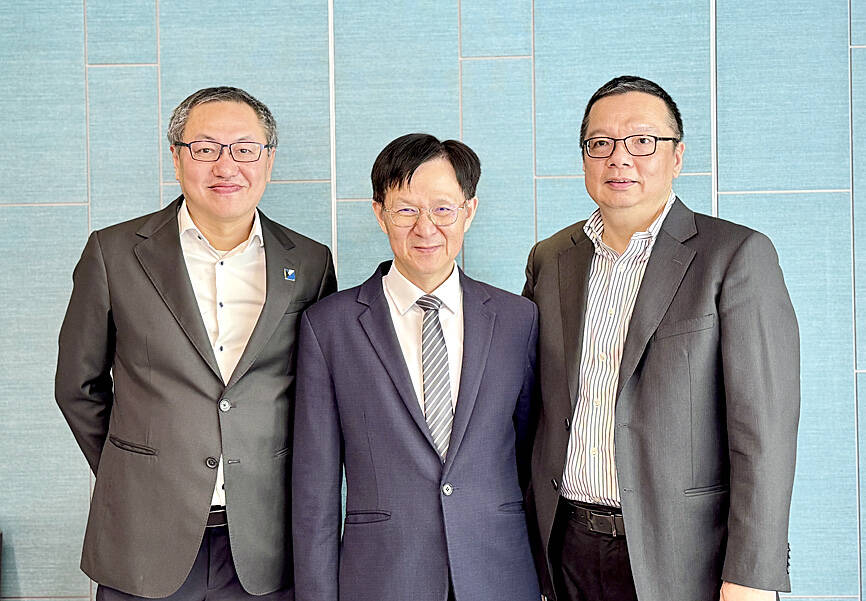Rayzher Industrial Co (銳澤), an industrial process gas supply integration engineering service provider, yesterday said it plans to set up its first US branch by the end of this year to meet growing customer demand, benefiting from the repositioning of the global semiconductor supply chain.
The company said it aims to provide local and real-time services as its major customers, including Taiwan Semiconductor Manufacturing Co (TSMC, 台積電) and Micron Technology Inc, are expanding their capacity in the US and launching longer-term expansion plans over the next five to 10 years in response to US President Donald Trump’s tariff threats.
“Our customers are expanding their capital expenditures in the US with a long-term investment plan there,” Lai Ming-kun (賴銘崑), president of Rayzher’s parent company, Acter Group Co (聖暉), told a media gathering in Taipei.

Photo courtesy of Rayzher Industrial Co
“Tariff issues are triggering a new wave of supply chain shifts. To cope with the trend, local companies are quickening their production allocation overseas,” Lai said. “As such, we have to follow our customers in moving overseas to satisfy their needs.”
Rayzher said a handful of Taiwanese companies in the semiconductor supply chain are poised to shift part of their operations to the US.
The company’s US branch is set to start operations next year and generate revenue contributions, it said.
Rayzher is also evaluating the feasibility of opening a branch in Europe, it added.
The company derived most of its revenue of NT$1.95 billion (US$59.3 million) last year from Taiwan. It expects to book revenue from Japan and Singapore this year, following the launches of its new branches in Japan’s Kumamoto and the city-state, it said.
Rayzher said it aims to grow its revenue by a double-digit percentage point this year to surpass the historical high of NT$2.3 billion generated in 2022.
Separately, Acter, which focuses on supplying semiconductor equipment and chemicals, yesterday said it has accumulated a record high backlog of orders worth NT$38 billion on a consolidated basis, up 21 percent from the same period last year, Lai said.
The estimate includes another subsidiary, Nova Technology Corp (朋億), which supplies water, gases and chemicals to semiconductor companies and electronics firms.
For Acter alone, the growth would mainly come from Southeast Asia, as customers are building new chip packaging facilities in Malaysia.
That would help boost the region’s revenue contribution to about 20 percent this year from 14 percent last year, it said. Taiwan would continue to be the largest revenue source, accounting for 60 percent, it added.
Acter said it has obtained its first orders to build chip manufacturing facilities for local foundry service providers this year. The company specializes in building factories for chip packagers and testers.

UNCERTAINTIES: Exports surged 34.1% and private investment grew 7.03% to outpace expectations in the first half, although US tariffs could stall momentum The Chung-Hua Institution for Economic Research (CIER, 中華經濟研究院) yesterday raised its GDP growth forecast to 3.05 percent this year on a robust first-half performance, but warned that US tariff threats and external uncertainty could stall momentum in the second half of the year. “The first half proved exceptionally strong, allowing room for optimism,” CIER president Lien Hsien-ming (連賢明) said. “But the growth momentum may slow moving forward due to US tariffs.” The tariff threat poses definite downside risks, although the scale of the impact remains unclear given the unpredictability of US President Donald Trump’s policies, Lien said. Despite the headwinds, Taiwan is likely

When Lika Megreladze was a child, life in her native western Georgian region of Guria revolved around tea. Her mother worked for decades as a scientist at the Soviet Union’s Institute of Tea and Subtropical Crops in the village of Anaseuli, Georgia, perfecting cultivation methods for a Georgian tea industry that supplied the bulk of the vast communist state’s brews. “When I was a child, this was only my mum’s workplace. Only later I realized that it was something big,” she said. Now, the institute lies abandoned. Yellowed papers are strewn around its decaying corridors, and a statue of Soviet founder Vladimir Lenin

UNIFYING OPPOSITION: Numerous companies have registered complaints over the potential levies, bringing together rival automakers in voicing their reservations US President Donald Trump is readying plans for industry-specific tariffs to kick in alongside his country-by-country duties in two weeks, ramping up his push to reshape the US’ standing in the global trading system by penalizing purchases from abroad. Administration officials could release details of Trump’s planned 50 percent duty on copper in the days before they are set to take effect on Friday next week, a person familiar with the matter said. That is the same date Trump’s “reciprocal” levies on products from more than 100 nations are slated to begin. Trump on Tuesday said that he is likely to impose tariffs

READY TO BUY: Shortly after Nvidia announced the approval, Chinese firms scrambled to order the H20 GPUs, which the company must send to the US government for approval Nvidia Corp chief executive officer Jensen Huang (黃仁勳) late on Monday said the technology giant has won approval from US President Donald Trump’s administration to sell its advanced H20 graphics processing units (GPUs) used to develop artificial intelligence (AI) to China. The news came in a company blog post late on Monday and Huang also spoke about the coup on China’s state-run China Global Television Network in remarks shown on X. “The US government has assured Nvidia that licenses will be granted, and Nvidia hopes to start deliveries soon,” the post said. “Today, I’m announcing that the US government has approved for us